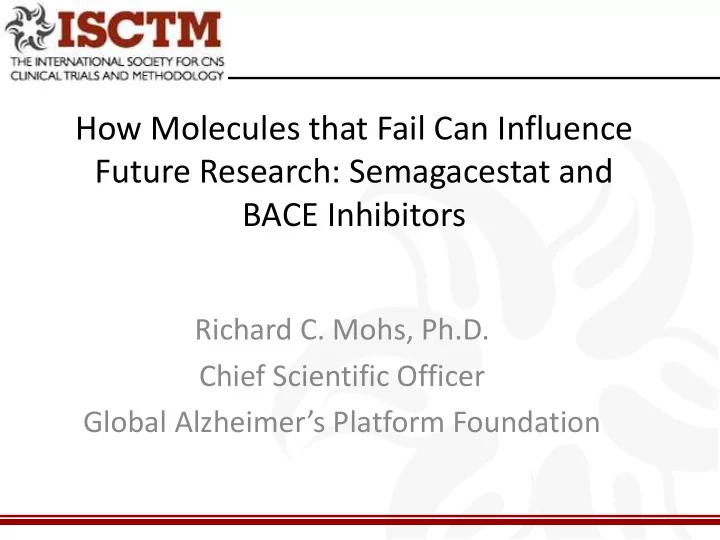

How Molecules that Fail Can Influence Future Research: Semagacestat and BACE Inhibitors Richard C. Mohs, Ph.D. Chief Scientific Officer Global Alzheimer’s Platform Foundation
Amyloid Cascade Hypothesis Increased A Production Decreased A Clearance Increased A Monomers, Oligomers, and Fibrils A Plaque Deposition Synaptic Dysfunction Neuronal Death, Atrophy of the Cortex, Hippocampus, and Amygdala Adapted from: Lichtlen P, Mohajeri MH. J Neurochem. 2008;104(4):859-874. Parameshwaran K, et al. Exp Neurol. [Epub ahead of print]. Evin G, et al. CNS Drugs. 2006;20(5):351-372.
Genetic Support for Amyloid Hypothesis: APP (A673T) variant partially blocks BACE cleavage, reduces A production and prevents Alzheimer’s Disease Amyloid plaque X APP X Oligomers A 40 A673T A 42 secretase secretase Essentially provides “proof of concept” for a AICD primary prevention trial for AD.
GSI-Semagacestat Showed Dose-Related Decrease CSF A-beta Production in Humans From: Bateman et al. AnnNeurol, 2009.
Semagacestat Worstened both Cognition and Function in Phase 3 From: Doody et al. NEJM, 2013.
Semagacestat Also Produced Significant Non- CNS Side Effects
Follow-Up from Semagacestat Experience • Other GSI molecules showed similar results (e.g.BMS molecule) • Substrates for GSI molecules other than a-beta (e.g. NOTCH) being investigated • Little further development of GSI molecules for AD (GS Modulators still studied) • Shift to development of BACE inhibitors and antibodies for AD • GSI molecules may be useful in oncology (van Es et al. Nature, 2005) and otolaryngology (Hori et al. Neuroreport, 2007)
Solenazumab Showed Small Effect on Progression in EXPEDITION1, EXPEDITION2 and Pooled EXPEDITION1 EXPEDITION2 Pooled 9 9 9 p=.120 8 8 Placebo Mild 8 p=.006 p=.001 LY400mg Q4W Mild 7 7 7 LS Mean Change in ADAScog 14 Score 6 p=.010 6 6 5 5 5 p=.025 4 4 4 3 3 3 p=.024 2 2 2 1 1 1 0 0 0 0 12 28 40 52 64 80 0 12 28 40 52 64 80 0 12 28 40 52 64 80 -1 -1 -1 -2 -2 Weeks Weeks Weeks -2 Pooled analysis represented 34% slowing in cognitive decline at 80 weeks: EXPEDITION 3 showed non-significant slowing estimated at 11%; development discontinued. From: Doody et al. NEJM, 2014.
BACE Inhibition May be Safer, More Potent Approach: Assays for Aβ Enable Dose Selection From: Timmers et al. Alz&Dem, 2016
BACE Inhibitors Continue in Development • Some terminated due to Liver toxicity. • Preclinical data warn of retinal problems. Need for eye exams in development programs. • Potential skin problems. Need for skin exams in development programs. • Remains to be determined whether these toxicities are mechanism related or off-target. • Efficacy still uncertain but multiple programs ongoing.
Trends Following Sema, Sola, Other Antibody and BACE Results Ongoing studies will be completed BACE Inhibitors Other antibodies Symptomatic agents Complimentary Mechanisms will be Emphasized More potent antibodies GS Modulators Different Mechanisms will be Emphasized Anti-tau agregants Anti-inflammatories Symptomatic agents Smaller/less expensive POC studies will be more preferred EPAD-Like studies Study economics will be key
Improvements and Questions on Methodology • Improvements Biological Homogeneity improved by amyloid imaging, CSF biomarkers (a-beta, tau), and genetic risk (APOE genotype) Natural history data enables sample size estimates (ADNI, others) Outcome measures for cognition, function, psychiatric symptoms and global PD biomarkers (plasma and CSF) for compounds targeting a- beta and tau • Lingering Questions Stage of disease to target, dementia, prodromal, preclinical Matching outcomes to disease stage Can we do smaller, shorter studies that are informative?
Questions at Study Initiation • Is the study informative even if the results do not show efficacy? • Is it worth the cost if the results are negative? • Can the scientific question be answered at less cost? • Will the results of the study inform future studies, regardless of outcome?
Recommend
More recommend